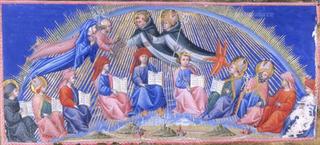
In a spurt of optimism, I checked out a new Penguin collection of writings by St. Thomas Aquinas from the library, thinking I'd actually have time to read some of it. As it was, I only had the chance to read one short essay: On Being and Essence. (Very good reading, of course.)
But what has me thinking at the moment isn't the text itself, but the cover art, which was a very nice reproduction of this fresco called The Triumph of Saint Thomas Aquinas.
Now, this is an allegory, not a depiction of heaven I found myself reminded of the paintings of Dante's celestial rose. And this got me thinking (sorry, hope all this "made me think" stuff doesn't sound too bloggish) that one of the biggest differences between Aquinas' (and Dante's) world and our own is the constant and obvious threat of death that our Catholic forebears experienced.
What, after all, do we believe in? What concept was it that converted a pagan world to Christianity? More than loving your neighbor, more than giving to the poor, more than the Christian moral synthesis, the primary attraction of Christianity was that it answered people's deepest questions and fears about death. Christ triumphed over death. Christ brought us the good news that we were each created and loved by God and that God yearned for us to be united with Him forever in heaven.
A lot of Catholic bloggers have pointed out that one thing you will almost never hear a sermon about is sex. Priests don't want to tell people that what they may be doing is wrong. But number two on the list of avoided topics is death. How often have you heard from the pulpit about "Death, Judgement, Heaven, Hell." And yet, why were we created? Baltimore catechism style, we were created to know love and serve God and be happy with him one day in heaven. What do we celebrate in the mass? We celebrate Christ's death and resurrection, whereby he won for us forgiveness for our sins and the fruits of eternal life.
Yet as a group, modern Catholics don't tend to be all the morbid. We don't think much about death. Like the rest of society, we think about how to make the world a better place and how to live a happy and fulfilled life.
In reality, though, it's all leading towards four things: Death, Judgement, Heaven, Hell.






No comments:
Post a Comment